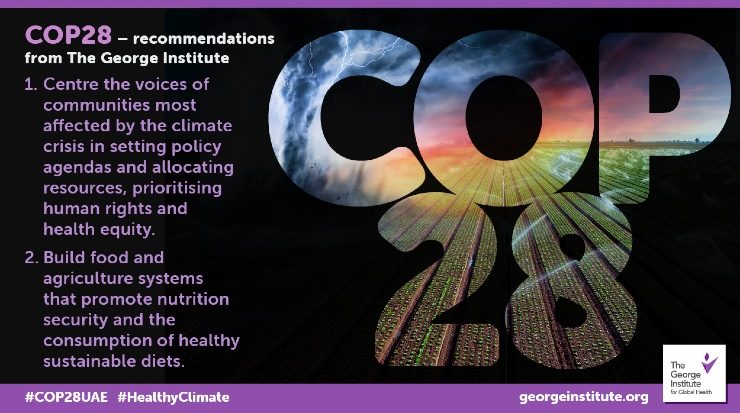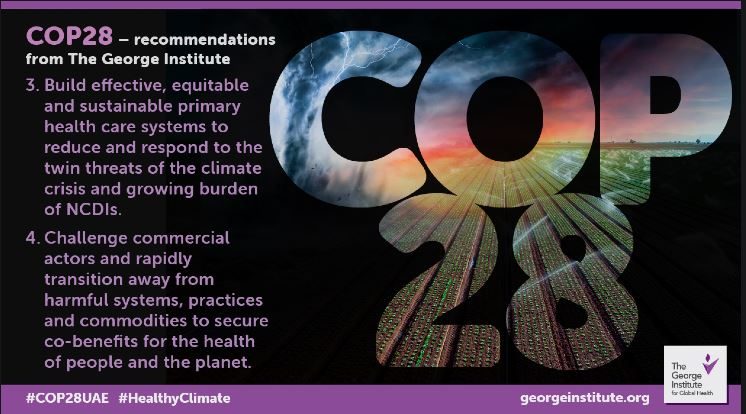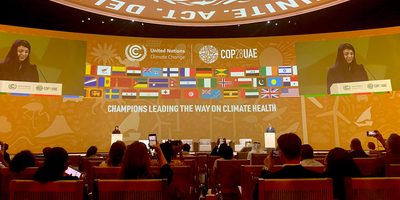
The George Institute calls for community-driven, intersectoral action at COP28
From 30 November – 12 December, world leaders will gather in Dubai for the 2023 United Nations Climate Change Conference, COP28. For the first time, the conference will include a designated ‘health day’ and a climate-health ministerial where governments around the world will endorse a Declaration on Climate and Health, developed with the World Health Organization (WHO) in recognition of the unprecedented threat to human health the climate crisis represents.
The George Institute will be sending a delegation of experts and advocates to COP28 and expects to have its Observer status formally approved by the UN Framework Convention on Climate Change during the conference. The Institute will join other Observer organisations, including UN agencies and inter- and non-governmental organisations, in participating in future COPs.

Global heating has sparked the worst health and humanitarian catastrophe in history. The George Institute is once again making an urgent call for world leaders to centre the voices of communities whose health, well-being and futures have been most impacted, ensuring they are at the heart of national climate action plans and debate.
Communities experiencing marginalisation as a legacy of historic power structures now face the twin threats of rapid environmental change and a fast-growing burden of non-communicable diseases and injuries (NCDIs), already the biggest killer of people globally. Rates of injury, cardiovascular and acute and chronic kidney diseases, respiratory illness, and mental health conditions are rising along with temperatures.[1][2]
With a growing global population and increasing urbanisation, cities are facing huge pressures. Globally, road traffic crashes kill 1.35 million people every year and are responsible for over 50 million more non-fatal injuries.[3] Ninety per cent of these deaths and injuries occur in low- and middle-income countries (LMICs). At the same time, urban traffic is a major source of pollutants, which not only contribute to global heating but have both short- and long-term adverse health effects, including serious impairment to lung function and links with chronic respiratory disease and other major NCDs, particularly for children.[4]
The impact of climate change is supercharged by unhealthy and unsustainable environments where people live, play, learn and work. The global food system, for example, promotes the consumption of diets high in fat, sugar and salt and low in diversity, fuelling a pandemic of diabetes, cardiovascular diseases, malnutrition and other NCDs.[5][6] It is also one of the largest contributors to environmental degradation - through greenhouse gas emissions, water use and deforestation - and one of the sectors hardest hit by climate change. Access to information about the nutritional quality and environmental impacts of the food we eat is a basic consumer right, yet is lacking.
Governments need to plan for increasing rates of NCDIs and include these population health impacts within climate risk and vulnerability assessments. At the COP, we urge delegates at the health-climate ministerial discussion to commit to developing a framework to address climate risks to health and health systems within adaptation plans.
The George Institute for Global Health calls on governments at COP28 to make a number of commitments aligned to the research we conduct and our findings:
Centre the voices of communities most affected by the climate crisis in setting policy agendas and allocating resources, prioritising human rights and health equity.
- Ensure that the Traditional Knowledge of First Nations and Tribal peoples, and the voices of other communities experiencing marginalisation, are heard.
- Focus on women, girls, young people and other groups who experience the impacts of the climate crisis disproportionately, including when allocating health-related climate financing.
- Establish mechanisms to ensure the meaningful participation and inclusion of communities and civil society in climate-related policymaking.
Build food and agriculture systems which promote nutrition security and the consumption of healthy, sustainable diets.
- Work with First Nations and Tribal peoples, local communities, consumers and researchers to identify and implement policies that can improve the diversity, nutritional quality and sustainability of the food supply, while reducing food loss and waste.
- Increase the knowledge and evidence base on the contribution Indigenous, agroecological and small-scale farming can provide to deliver sustainable, healthy diets for all.
- Ensure accurate and timely information about the nutritional quality and environmental impacts of food is easily accessible to consumers.
Build effective, equitable and sustainable primary health care systems to reduce and respond to the twin threats of the climate crisis and the growing burden of NCDIs.
- Strengthen the provision of mental health support and other primary health care services to improve psychological resilience and adaptation skills in the wake of environmental damage.
- Develop robust digital platforms to monitor and evaluate NCDIs and climate threats and generate high-quality data to support decision-making.
- Include health in nationally determined contributions and reduce the contribution of the health care sector to environmental degradation by researching and implementing low-emission primary health care solutions.
- Prioritise the development of climate risk and vulnerability assessments for high-risk communities and a framework of vulnerability indicators.
Challenge commercial actors and rapidly transition away from harmful systems, practices and commodities to secure co-benefits for the health of people and the planet.
- Set and enforce urban speed limits of 30km/h or lower to address road traffic injuries, promote physical activity, and reduce air pollutants
- Regulate the burning of plastic waste, improve waste management systems and hold stakeholders to account for collecting and controlling the waste they create.
- Identify alternative water sources for coastal and inland communities vulnerable to rising drinking water salinity; such as rainwater harvesting and reverse osmosis.
- Call for a strengthened UNFCCC Conflict of Interest Policy that further reduces the opportunity for influence by unhealthy commodity industries on COP outcomes.
The George Institute is proud to be a member of the WHO Civil Society Working Group to Advance Action on Climate and Health, and a signatory of the COP28 Recommendations developed by the Global Climate & Health Alliance, whom we have recently joined as a member.
The George Institute seeks to ensure that evidence informs the development and implementation of social, economic and environmental policies to address climate change and other urgent global health challenges. We are committed to placing at the heart of our work Traditional Knowledges of First Nations and Tribal Peoples and the voices of other communities experiencing marginalisation. We work closely with these communities, stakeholders and policymakers at local, national and global levels to address and reverse the ongoing impacts of climate change on human health and equity. Read more about our planetary health work here.
Find out more about two of our flagship planetary health initiatives:
- The Global Health Research Centre on Non-Communicable Diseases and Environmental Change, led by The George Institute India in collaboration with Imperial College London, is conducting research in partnership with local communities in Bangladesh, India and Indonesia.
- The Healthy Food, Healthy Planet, Healthy People Centre for Research Excellence, led by The George Institute Australia, is researching the nutritional quality and environmental impact of the food supply, aiming to provide evidence-based recommendations for government and market-based strategies for sustainable food systems.
References
[1] Climate change may be causing chronic kidney disease by triggering dehydration and heat stress (2016) The George Institute for Global Health. Available at: https://www.georgeinstitute.org/media-releases/climate-change-may-be-causing-chronic-kidney-disease-by-triggering-dehydration-and
[2] Why Mental Health is a priority for action on climate change. World Health Organization (2022) Available at: https://www.who.int/news/item/03-06-2022-why-mental-health-is-a-priority-for-action-on-climate-change.
[3] Road traffic injuries (2022) World Health Organization. Available at: https://www.who.int/news-room/fact-sheets/detail/road-traffic-injuries.
[4] Atkinson, R.W., et al., Fine particle components and health—a systematic review and meta-analysis of epidemiological time series studies of daily mortality and hospital admissions. Journal of exposure science & environmental epidemiology, 2015. 25(2): p. 208-214.
[5] Diverse healthy diets for all: how a focus on healthy diets can transform food systems and climate action, Climate and Planet (2023) Health Climate Network. Available at: https://healthandclimatenetwork.org/diverse-healthy-diets-for-all-how-a-focus-on-healthy-diets-can-transform-food-systems-and-climate-action/.
[6] Centre of Research excellence: Healthy Food, healthy planet, healthy people (2022) The George Institute for Global Health. Available at: https://www.georgeinstitute.org/projects/centre-of-research-excellence-healthy-food-healthy-planet-healthy-people.








